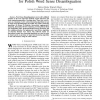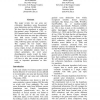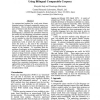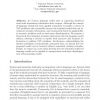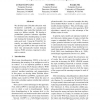122 search results - page 5 / 25 » Sequential Model Selection for Word Sense Disambiguation |
IMCSIT
2010
13 years 4 months ago
2010
Word Sense Disambiguation in text is still a difficult problem as the best supervised methods require laborious and costly manual preparation of training data. Thus, this work focu...
CORR
2000
Springer
13 years 7 months ago
2000
Springer
This paper revisits the one sense per collocation hypothesis using fine-grained sense distinctions and two different corpora. We show that the hypothesis is weaker for fine-graine...
COLING
2002
13 years 7 months ago
2002
An unsupervised method for word sense disambiguation using a bilingual comparable corpus was developed. First, it extracts statistically significant pairs of related words from th...
CICLING
2008
Springer
13 years 9 months ago
2008
Springer
An N-gram language model aims at capturing statistical word order dependency information from corpora. Although the concept of language models has been applied extensively to handl...
EMNLP
2007
13 years 8 months ago
2007
We develop latent Dirichlet allocation with WORDNET (LDAWN), an unsupervised probabilistic topic model that includes word sense as a hidden variable. We develop a probabilistic po...
